AJN News
For Israel, accords with UAE and Bahrain are «a huge opportunity» to bring Palestinians back to negotiation table
AJN Agency – In an exclusive interview with the AJN News Agency, Israeli Foreign Ministry spokesman Lior Haiat stressed that «the Palestinians have to make a decision as to which side of history they are on: the side of peace or the side of the enemies of peace. He also pointed out that Prime Minister Benjamin Netanyahu was a » central » figure for the achievement of peace deals.
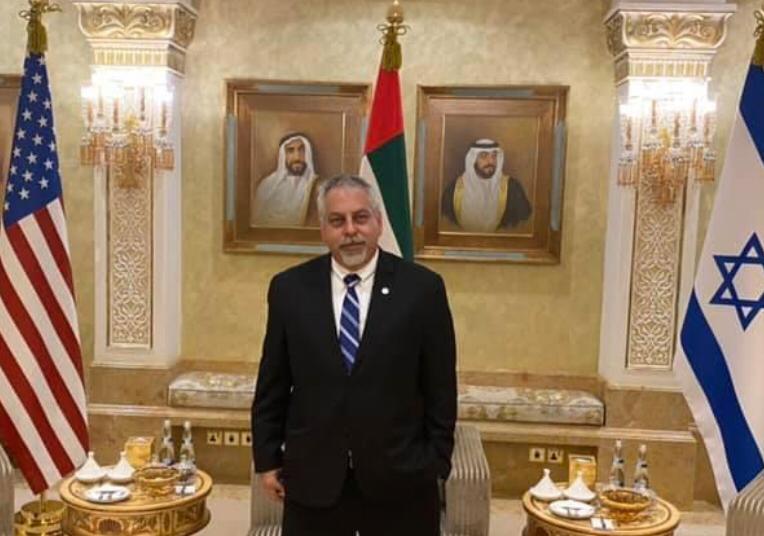
AJN Agency.- Israel said that the agreements for the normalization of relations with the United Arab Emirates and Bahrain represent «an enormous opportunity» for the Palestinians to decide to «return to the negotiating table and advance on the peace process» in the Middle East conflict. This was transmitted by Israeli Foreign Ministry spokesman, Lior Haiat, who in an exclusive interview hours before the signing of the historic agreement in Washington, stressed that «the Palestinians have to make a decision on which side they are on in history: on the side of peace or on the side of the enemies of peace». «Netanyahu is the central player in the agreement as is the US President Trump’s administration,» Haiat added in dialogue with the AJN Agency.
In addition, Haiat said these U.S.-sponsored agreements «created two groups in the Middle East: those who support peace, which are most moderate countries, and those who are against peace, which are led by Iran and terrorist organizations like Hezbollah and Hamas.
The following are the most important parts of the interview with Lior Haiat:
-AJN: Why is this agreement that Israel signs with the United Arab Emirates and Bahrain important?
-LH: This peace agreement totally changes the current reality of the Middle East and brings a new era, a new level for Israel and Arab countries. These are two agreements that are going to create not only relations between governments but also between people, it is going to create bridges to favor tourism and commercial exchange.
-AJN: From a commercial point of view, what effect will these agreements have?
-LH: There are no details yet. We have seen in the past few years that Israel has worked under the radar that there is already a very large interest from these countries to cooperate with Israel financially. One of the first steps we have taken with the UAE is to sign an agreement that allows Israeli investments in local companies as well as UAE investments in Israeli technology companies. There is a huge potential in finding clients but also partners and investors.
-AJN: There has been a lot of talking about cooperation between the two nations, but what would it be like and what is Israel’s goal in this cooperation?
-LH: First of all, what Israel has sought since the day the state was created is peace with our neighbors. That peace process began 41 years ago with peace with Egypt and 15 years later with peace with Jordan, and it took sixteen more years for peace with the United Arab Emirates and 29 more days to announce peace with Bahrain. It is part of the same process that Israel’s relations with Arab countries are improving and we hope that other countries will embrace this process and hopefully the Palestinians will join in, because it is a huge opportunity for the Palestinians to return to the negotiating table and advance on the way to peace.
-AJN: When and how did the talks that will end with the signing tomorrow in Washington begin?
-LH: For more than 20 years we have had some kind of contact with the Gulf countries. These contacts had their ups and downs depending on the situation in the Middle East, the world situation and many other factors. In the last few years we have seen a very clear process that is improving more and more and has been going on much faster in the last few months and much faster in the last few days.
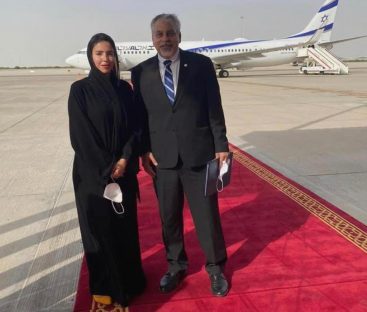
Lior Haiat with the Director of Strategic Communications of UAE’S MFA, Hend Al Otaiba.
-AJN.- Can Netanyahu be credited with the success of the agreement?
-LH: Netanyahu is the central player in the agreement as well as the United States and Trump Administration. We are very grateful for the effort that our American ally is making to improve relations with our neighbors. Without U.S. support and pressure, we could not have reached this point.
-AJN: What other Arab countries could join this process?
-LH: I think there are a few more countries, each with its own pace. In the coming days or weeks we are going to hear more good news and that the leadership shown by the UAE government and Bahrain is going to be a model for other regional leaders. Those leaders understand very well that having relations with Israel gives a lot of value to themselves, not just to Israel. In these peace agreements, it is the two peoples and the two countries who gain.
-AJN: Can it change the scenario for negotiations with the Palestinians?
-LH: Hopefully, yes. These agreements created two groups in the Middle East, those who support peace, which are most of the moderate countries, and those who are against peace, which are led by Iran and terrorist organizations such as Hezbollah and Hamas. The Palestinians have to make a choice of which side they are on in history: the side of peace or the side of the enemies of peace.
-AJN: Within the negotiations, there was a point linked to the annexation plan, with Israel finally resigning its intention to incorporate these territories.
-LH: Israel’s plan for sovereignty over Judea and Samaria is on hold. For now, there is no agenda.
– AJN: What is the situation regarding the possible sale of US planes to the United Arab Emirates?
– LH: Obviously I am not going to talk about national security issues in the media. Our allies in the United States understand very well Israel’s security needs in the Middle East and will respect that and that has nothing to do with US relations with the Emirates.
-AJN: What is the security benefit of normalizing relations with these Arab countries?
-LH: As I said, this agreement creates a new era in the Middle East and gives more security and stability to the region. The fact that Bahrain joined it also contributes to this new stage. The Middle East needs to take over the peace process because it will benefit all countries and peoples.
AJN News
Argentina. Milei reflected on the Torah: «Those who play in all directions are the worst»
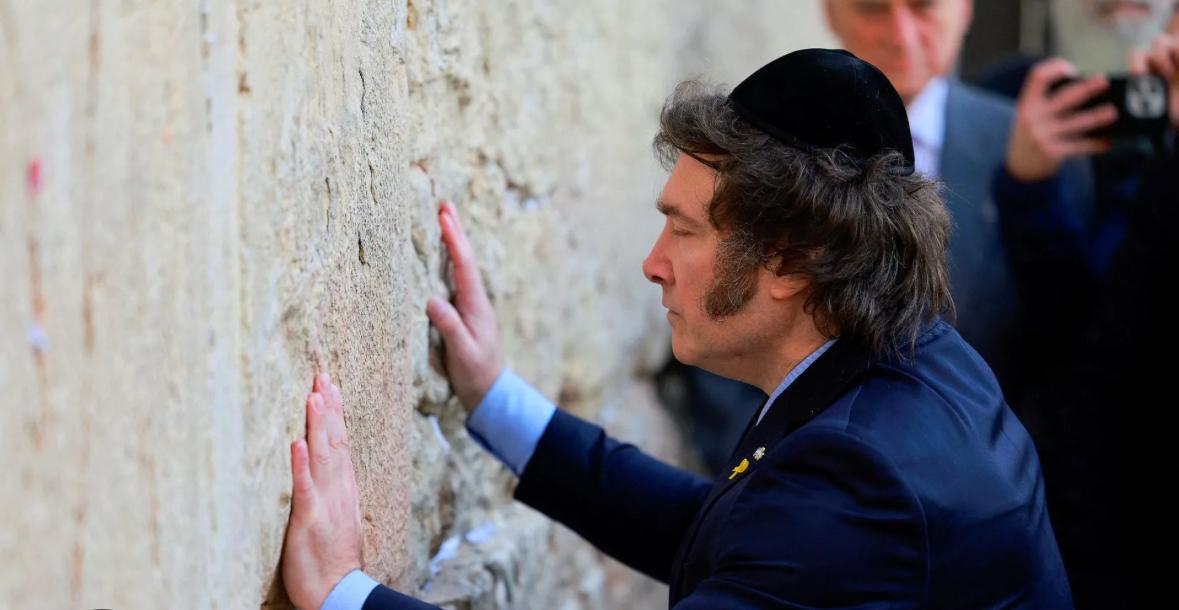
Agencia AJN.- Argentinian President, Javier Milei, once again resorted to the Torah, the sacred book of Judaism, to make a «reflection», such is the title of a post on his personal profile on the social network X that alludes to the political situation in his country, although in general terms.
On this occasion he referred to the current parashah (weekly reading portion of the Torah), Toldot, corresponding to the Book of Breishit (Genesis), which extends from perek (chapter) 25 and pasuk (verse) 19 to 28:9.
«The parasha says that Rivka, the wife of Yitzchak (Rebekah and Isaac), was worried when she was pregnant, because when she passed by a place of sanctity she felt that her son wanted to go there and when she passed by an impure place, too. And she was worried. and she went to consult with a prophet. The prophet answered her: you have two sons in your womb. One will be a leader of the people of Israel (Yaakov, Jacob) and another Esav who will be very evil, and will want to harm Yaakov and his offspring. And then she calmed down,» said the South American president.
«The question: does Rivka calm down after she is sure that she has a completely evil son, and before when she thought she had only one son she didn’t know what he would be like she was very disturbed?,” he asked.
«The answer: Rivka, when she thought that she had a single son, that he was LUKE without ideology and played for both sides, that worried her a lot. But then she found out that she has two, and it is clear that one plays for one side and the other completely the other way around, she calmed down,» Milei answered.
«Moral: Those who play for all sides are the worst of all, even much worse than the one who is completely evil. Because the one who is evil and shows himself as such, we have identified him. On the other hand, the other behaves like a good person and we never know what his attitudes and his evil intentions are,» he concluded, before saying goodbye with a «SHABAT SHALOM.»
AJN News
Argentina | Holocaust and Heroism Day. President Milei’s major speech against anti-Semitism and terrorism
»Therefore, in keeping with our history and with what we consider to be true, we ratify today our spirit of friendship and collaboration with the State of Israel and we offer Argentina’s candidacy for the International Presidency of the IHRA», expressed Milei.
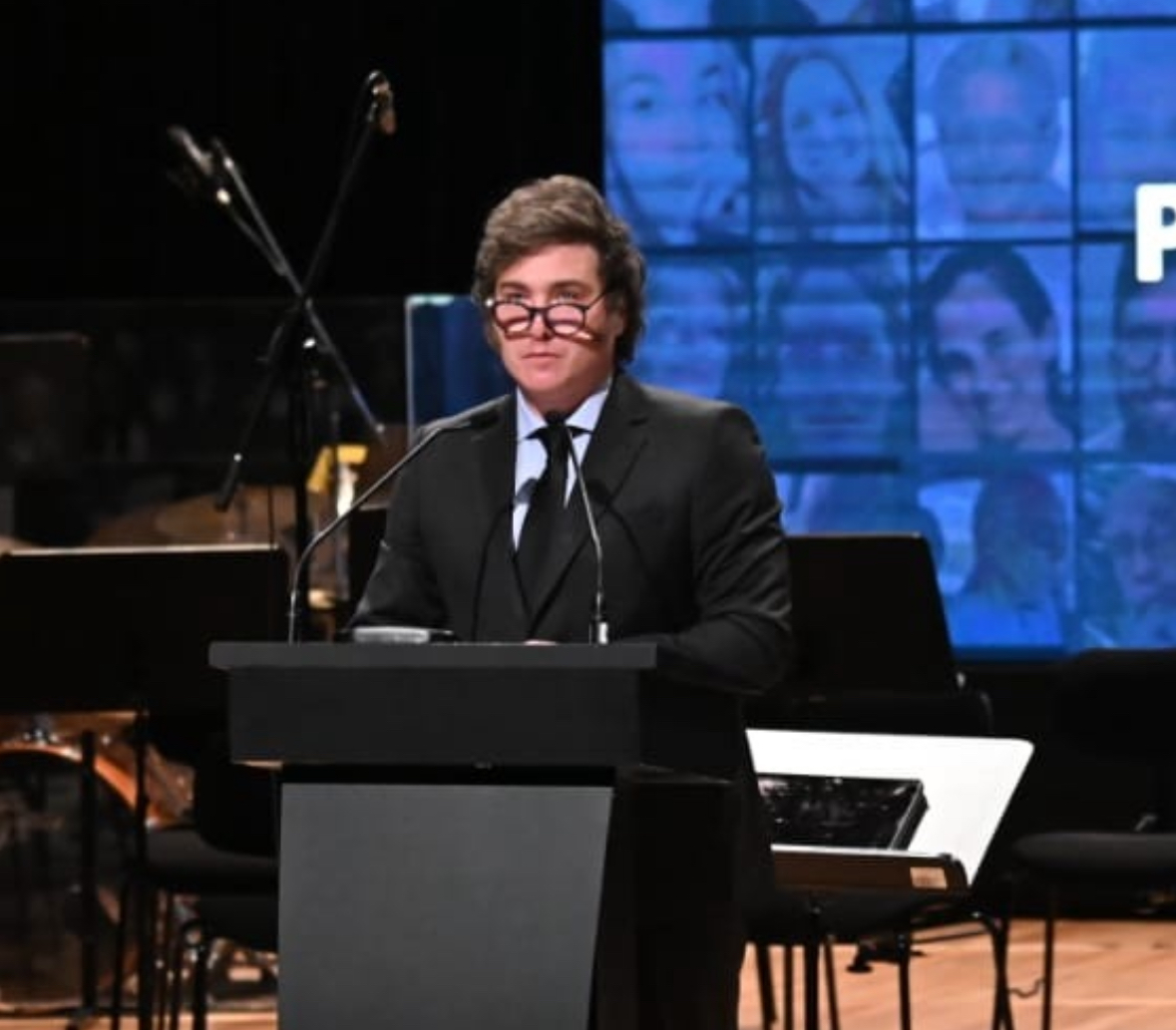
Agencia AJN.- At an event organised on Wednesday by the Delegation of Argentinean Israelite Associations (DAIA) and the Holocaust Museum of Buenos Aires to commemorate Holocaust and Heroism Day, the 81st anniversary of the Warsaw ghetto uprising, President Javier Milei announced ‘Argentina’s candidacy for the presidency of the International Holocaust Remembrance Alliance’ (IHRA).
The IHRA is an intergovernmental organisation of 35 states whose aim is to combat acts of anti-Semitism, intolerance and discrimination that can lead to genocides such as those experienced by humanity in the 20th century.
The main event was also attended by Nazi survivors, relatives of people kidnapped by Hamas, national, provincial and municipal authorities, judges, political leaders, diplomats, representatives of different religious denominations, community leaders, among others.
Argentina. Discurso y anuncio del presidente Javier Milei en el acto del Día del Holocausto organizado por el Museo del Holocausto y la DAIA @JMilei @DAIAArgentina @museoshoa #HolocaustRemembranceDay #YomHaShoah @Isaac_Herzog @AmbEyalSela @netanyahu #israel @israelmfa… pic.twitter.com/8uQVSq1inE
— Agencia AJN (@AgenciaAJN) May 9, 2024
President Milei’s full speech:
At the outset, I would like to pay tribute to Lior Rudaeff, an Argentinean living in Israel who was kidnapped and murdered by the Hamas terrorist organisation on 7 October. I would like to extend my sincere condolences to his family and loved ones, and call for the return of his body so that he can be given a proper farewell by them. Baruch Dayan Haemet to him and to all the victims of Islamic terrorism in Argentina and the world.
Today more than ever there can be no doubt that the scourge of Islamic terrorism on Israel and the Jewish people is not a problem alien to us Argentines, but one that affects us directly. First, because 21 Argentines were murdered by Hamas on that tragic day, 20 more Argentines were kidnapped and today, seven months after the attack, there are at least eight compatriots for whom we still do not know whether they are still among us or whether they have passed on to another life. Secondly, because when a battle is fought between good and evil, between freedom and oppression, between civilisation and barbarism, taking sides is not one option among others but a moral obligation.
Today we are here to remember perhaps the greatest tragedy in the history of mankind, we are doing so under the name of Holocaust and Heroism Day, and I would like to pause to discuss with you this second concept, heroism. Because I believe that the heroism and virtue of men is the flip side of tragedy, it is the only thing that can make the righteous prevail over those who seek to oppress them and rob them of their freedom. And because I believe that in times of darkness, when speaking out is costly and when the majority prefer to turn their backs on righteousness for their own convenience, promoting virtue is a commandment and a duty.
We remember today the Jewish resistance in the Warsaw ghetto, where 300,000 souls were imprisoned in inhumane conditions for three years by the Nazi regime, only to be transferred to extermination camps as we all know. We remember that one day in 1943 the prisoners took what few weapons there were and put up a fight. For 27 days they fought for their freedom, under unequal conditions and with virtually no chance of success. They fought for their freedom, which is a just cause in every time and place, and they chose to die fighting rather than be killed.
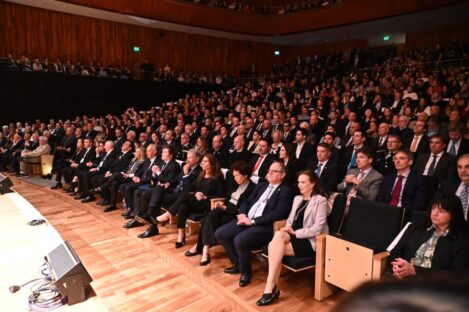
The struggle for freedom against adversaries always more powerful than themselves has been a constant in the history of the Jewish people, and has forged for them a heroic spirit, a warrior spirit. This is already clear in the sacred scriptures, it is seen in the exodus of the Jewish people from Egypt, escaping from the yoke of Pharaoh, leaving behind slavery to embrace freedom. The revolt of the Maccabees is clear when, despite being in a distinct minority, the least against the most, the weak against the powerful, they drove out the Greek invader and recaptured Jerusalem. It was never the number of soldiers that mattered, but the forces that came from heaven.
Fighting battle upon battle for over 4,000 years, though many were lost and though the temple in Jerusalem was destroyed twice, the Jewish people persisted. And today again, being under threat, surrounded by enemies who pursue a goal akin to the goal of those who imprisoned more than 300,000 souls in the ghetto 80 years ago, because the intention of Hamas on 7 October was the same as that of the Nazis, to directly and deliberately murder innocent people, if they did not do it on a larger scale, it was not because they did not want to but because they could not.
Today, we see in parallel to these sad events a recognition in the world of both intolerant Islamic fanaticism and anti-Semitism in its different versions. And to make matters worse, we see how all these phenomena are not perceived by the free world with the sharp condemnation and firm action they demand, but with discomfort and ambiguous gestures. I look around me at the rest of the leaders of the free world, especially the leaders of the great nations that should be the pillars of global freedom, and I see indifference in some and fear in others to stand on the side of truth.
Today the world is silent while there are still more than 100 hostages suffering, eight of whom are fellow Argentines. Not to mention the blatant anti-Semitism that has become commonplace on the campuses of educational institutions entrusted with the professional and human training of the West’s elites. I believe that the heroism we talk so much about and want to promote is also to defend the truth, to speak the truth when around us the truth is silenced.
That is why when the world is silent, we have an obligation to speak out, because it is the silence of the good that allows the barbarity of the bad, and because speaking out, looking straight and not turning a blind eye, even though it is difficult, even though for many it is inconvenient, is the only way to ensure that the Shoah is not repeated.
Emotivo acto del Día del Holocausto en Argentina con la presencia del presidente @JMilei organizado por @museoshoa y @DAIAArgentina.@JKnoblovits @CancilleriaARG @mondino @IsraelMFA @JonathanPeled @Isaac_Herzog @netanyahu @AmbEyalSela @LiorHaiat @BringThemHome23 #Israel pic.twitter.com/4gau1RIqiR
— Agencia AJN (@AgenciaAJN) May 9, 2024
And because God will not accept justifications or exculpations when it comes to rendering his ultimate judgement, we will not be able to tell him what, but I could not or what virtue was not convenient at the time, he will not judge us for what we thought, believed or wanted, but for having done the right thing in life. That is why today remembering the Shoah, remembering heroism and denouncing Islamic terrorism is an obligation, because without heroes we are defenceless in the face of an ever darker and longer night.
In closing I would like to thank Marcelo Mindlin, Jorge Knoblovits and the rest of the authorities of the DAIA and the Holocaust Museum for organising and inviting me to be part of this commemoration at such a difficult time for the Jewish people that demands that we all work back-to-back.
I also want to tell you that Argentina is a historic friend of the Jewish people. We were the first country in the region to recognise the existence of the State of Israel and today we proudly have the largest Jewish community in Latin America and the tenth largest in the world. Together with the Jewish community, we have suffered the cowardly attacks by the Iranian government, not only on the Jewish-Argentine community, but on the Argentinean people as a whole, which, thanks to the persistent efforts of those who seek the truth, are now, three decades later, beginning to be clarified.
Therefore, in keeping with our history and with what we consider to be true, we ratify today our spirit of friendship and collaboration with the State of Israel and we offer Argentina’s candidacy for the International Presidency of the IHRA (video), an institution whose value takes on new relevance and urgency every day, at a dark time, when the rest of the world is turning its back on Israel, they will find us at their firm side always.
Finally, and lastly, I would like to conclude with a letter from Rabbi Samson Raphael Hirsch, which seems to me to be very pertinent to the times we are living in and which should be present in our lives every day. This letter says: ‘Those who are convinced that their opinions are true and correct must express them constantly and at every opportunity with candour, and without regard to the degree of support they have and the level of opposition they will encounter. Lies need supporters to succeed; lies need the authority of majorities to fill what they lack in the rightness of their argument. Truth, on the other hand, will always win out in the end. Even if it takes time, noble, courageous and pure, expressed with all the ardour of conviction and with all the clarity of a sure conscience, expressed again and again on every occasion, it will eventually win the respect and esteem of even those who refuse to accept it. The only truth that has been lost without the possibility of regaining it is that whose possessors have not the courage to speak frankly of it. Truth was never defeated by the forces of resistance, it was only defeated when its possessors were too weak to defend it’.
Thank you very much.
-

 Israelhace 5 horas
Israelhace 5 horasIsrael: 17 heridos, dos de ellos graves, tras impacto de misil balístico iraní en Haifa
-
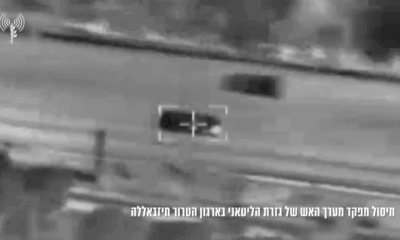
 Medio Orientehace 5 horas
Medio Orientehace 5 horasEliminado en el sur del Líbano el comandante de artillería de Hezbollah responsable de ataques contra Naharía y Haifa
-
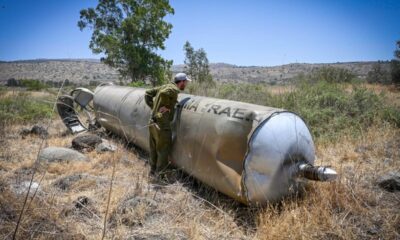
 Guerrahace 23 horas
Guerrahace 23 horasFragmentos de bombas de racimo iraní generan temor en Israel: ¿el misil iraní llevaba múltiples bombas?
-

 Guerrahace 24 horas
Guerrahace 24 horasLa aerolínea de bandera israelí El Al operará ‘‘vuelos especiales para emergencias médicas’’ el día del descanso para repatriar a sus ciudadanos
-
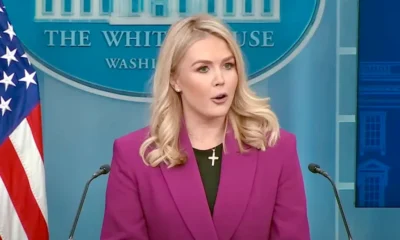
 Guerrahace 23 horas
Guerrahace 23 horasEE.UU.: Irán podría producir una bomba nuclear en «un par de semanas»
-
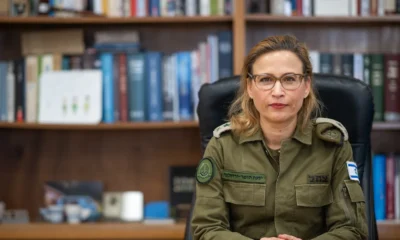
 Guerrahace 24 horas
Guerrahace 24 horasLa general que determina qué objetivos pueden ser atacados por Israel
-
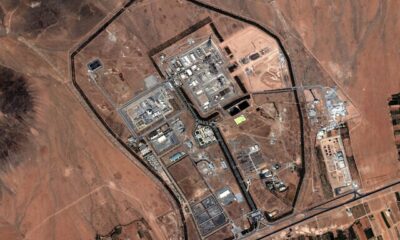
 Guerrahace 22 horas
Guerrahace 22 horasIrán. AIEA: El reactor de agua pesada de Arak fue dañado por un ataque israelí
-

 Israelhace 8 horas
Israelhace 8 horasNetanyahu y el jefe del Estado Mayor de las IDF se reúnen con altos funcionarios de EE. UU. mientras Trump evalúa atacar Irán




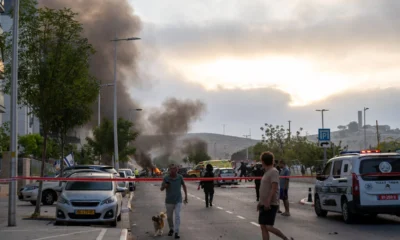

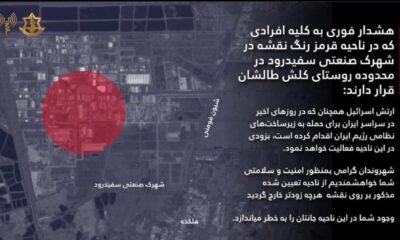

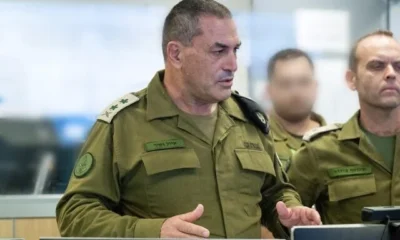

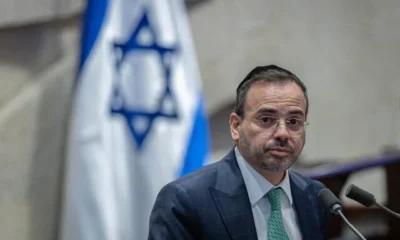


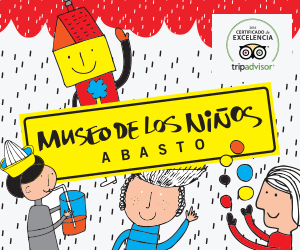
 Suscribite al Whatsapp!
Suscribite al Whatsapp!